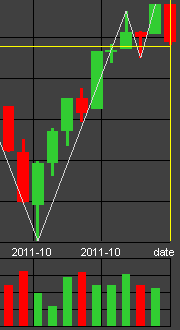 A sluggish economical recovery, weak job market, financial crisis in Europe, and the fear of global recession kept the major stock market indexes in a choppy pattern during 3rd quarter. However, October started with some good news and better-than-expected statistics. These were able to lift S&P-500 from 1075 to 1225 (almost 14%) for two weeks. Among good economic news: September was one of the best months of the year for the US automobile industry and retails. Also according to the latest GDP forecasts, the 3rd quarter can be the best quarter in a year.
A sluggish economical recovery, weak job market, financial crisis in Europe, and the fear of global recession kept the major stock market indexes in a choppy pattern during 3rd quarter. However, October started with some good news and better-than-expected statistics. These were able to lift S&P-500 from 1075 to 1225 (almost 14%) for two weeks. Among good economic news: September was one of the best months of the year for the US automobile industry and retails. Also according to the latest GDP forecasts, the 3rd quarter can be the best quarter in a year. The slow economy, high unemployment, Euro-zone crisis, and the threat of global recession might not find a quick solution but as old news all these have been priced already in a market equilibrium. The question is what will be the next. As a rule, the future expectation is the thing that drives the stock market, not the past performance. Statistically, November and December are bullish months of a year. In addition, this time the annual cycle may be propelled by positive economic projections. Therefore, if no more bad news wakes up the pessimism again, 2011 has a chance to end on a positive note.


